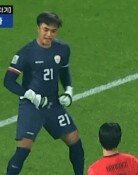Peaceful Solution is Reconfirmed on the North Korean Nuclear Issue
Peaceful Solution is Reconfirmed on the North Korean Nuclear Issue
Posted June. 11, 2005 06:34,
President Roh Moo-hyun visited the White House in Washington to have a summit meeting with U.S. President George W. Bush on June 10 (June 11, local Korean time) and reconfirmed two principles: that North Koreas possession of nuclear weapons would not be tolerated and that the two countries would resolve the nuclear issue peacefully through diplomatic channels.
The two heads of the countries made the consensus that related countries of the six-way talks would make every effort to bring the North to the negotiating table at this critical juncture, strongly calling on the communist countrys return to the six-way talks.
The Bush administration is considering coercive measures if and when the North does not show any future-oriented attitude despite the signal from the U.S. that the multilateral talks are still valid. The Korean government will find it difficult to object the U.S. policy, creating tacit consent between the two countries, said a senior official.
The two leaders have emphasized peaceful settlement of the issue in three summits since May 2003. However, the meaning of this summit is rather different in that they sent the message to the North that this may be in effect the last chance for it to come back to the talks.
President Roh talked about the progress in relations between the two Koreas, including the scheduled ministerial meeting from June 21 to June 24 and explained, The inter-Korean summit can be an effective channel of urging the North to abandon its nuclear ambitions and come back to the talks.
President Bush expressed his concern over the human rights status of people in North Korea and his counterpart explained the basic principles of the Korean government, according to a government official.
The two presidents made it clear that the Korea-U.S. alliance remains constructive and firm in the big picture even though it has gone through changes in nature over the last few years. At the luncheon following the summit, they exchanged their views on political issues in Northeast Asia including the Korea-Japan relationship that has suffered tensions recently.
During the working-level conference before the summit, the countries discussed their possible responses to the situations of the North continuing to boycott the talks (and worsening tensions), the fact that conditions involving the issue keep changing, and the improvement of matters once the North comes back to the talks. However, it is not clear whether the two presidents discussed this during the actual summit.
Meanwhile, a senior government official denied the Washington Post report that the Korean president is supportive of any semi-military response of the U.S. when diplomatic measures are exhausted, saying There was no agenda about that.
Jung-Hun Kim jnghn@donga.com







